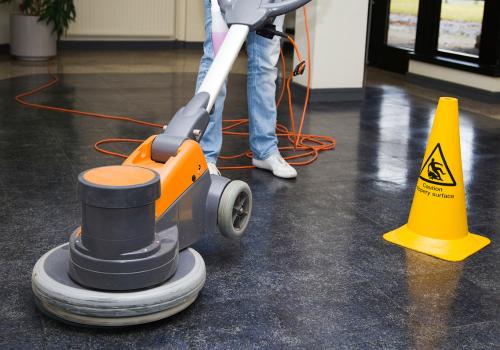
5 minute read
President's Perspective
It's Time to SPRUCE Up the Schools
Charles Warren, AAEA Board President
My first unofficial school position was as a summertime school custodian. My dad was the elementary principal and he had three healthy workers… I mean… sons. Our summer job was to move all the furniture out of the classrooms and then strip, scrub, and wax the classroom floors. What was our compensation? Our father’s love.
As a kid, it kept me busy and out of trouble. You probably recognize that your facilities team is very busy during the summer months. I’ve talked about hectic summer schedules for school business officials (SBOs). Well, the summer workload for facility staff is a close second.
They take advantage of the empty classrooms to put a real shine back on the schools. They are 12-month employees that truly work all 12 months because – to paraphrase a popular catchphrase from the 1980s –“dirt happens.” The grass grows, people litter, things break, kids throw up, and glitter gets everywhere. Facility management is a never-ending battle against a lot of elements.
I talked to Justin Robertson, the SBO at Russellville Public Schools and serves as the Chief Financial Officer (CFO). He’s a CPA like me with some serious cornhole skills. He spent some time (like a few other SBOs) overseeing operational departments including Facilities. I asked him a couple of questions about facility management from an SBO’s perspective.
He pointed out that the facility management leaders in Russellville are heavily involved with the Arkansas School Plant Management Association (ASPMA). This constituency group of AAEA is defined as “a professional education association open to all persons responsible for the management and day to day maintenance operations of the educational facilities.”
You may not know this, but ASPMA created the Certified Facility Director Program in 2012. Here’s what I found on the AAEA website about the program:
After consultation with the Arkansas Division of Academic Facilities and Transportation and reviewing similar certification programs in other states, a comprehensive program was developed to meet the needs of Arkansas school facility managers. In order to serve as the professional for their district in regards to the facilities in which the students learn, play, and dine, the facility manager should be certified in areas of health, safety, code compliance and cleanliness. The facility manager should also be knowledgeable in building systems, how those systems relate to each other to create the total building environment, and possess the skills necessary to properly manage the facilities.

If you spend any time with ASPMA members, they talk about the connection of their building to productive staff and students. Did you catch that? “Their building” - that’s how they talk – they take ownership of that school building. They understand that teaching and learning depends upon the warm, safe, and dry environments that they create.
Justin also shared about the importance they place on “preventive maintenance” at Russellville. Like most school districts, they utilize the Operations Hero software to prioritize and schedule building repairs and maintenance. SBOs like data and that’s a database demonstrating the important role of the facilities staff.
When I worked in the real world, our residential housing division taught me the term “deferred maintenance.” Deferred maintenance was such a problem that lenders required us to set aside funds each month in a bank account to cover major repairs and renovations.
Our real estate company spent a lot of time and effort emphasizing preventative maintenance to avoid the overlooked repairs becoming deferred maintenance. Believe it or not, allocating proper resources to pay for daily maintenance costs can often be more cost efficient than paying the bill on a deferred maintenance project.
From some legislators’ points of view, it appeared that more and more school districts were relying on insurance claim proceeds to address deferred maintenance items. Property insurance was paying for storm damage replacements and repairs to old roofs and heating, ventilation, and air conditioning (HVAC) equipment. They were concerned that this was the driving force of property insurance premium increases.
Whether or not their perceptions were reality, they created a state captive insurance program for all school districts. We all saw a sharp increase in our deductibles. Sadly, we did not see the expected decrease in annual premiums. We will wait and see how well they will handle future claims.
I think there is some validity for legislators to expect us to proactively address deferred maintenance. Their new approach will likely make all school districts begin to formulate a strategic plan to address aging buildings and equipment. To borrow from an old British expression, we have to “mind the gap” the change in deductible amounts have generated. I hope to create a “mind the gap” program in Fort Smith that I call “Strategic Plan to Replace & Upgrade Campus sites and Equipment” or SPRUCE. Feel free to steal that name before I trademark it.
Don’t tell anyone, but when I was a kid cleaning the classrooms, I would occasionally ride on the floor polisher that I called the scrubber. As I grew older, I got to run the scrubber. At first, I thought the scrubber required muscle to keep it from “flying off” in one direction. However, I learned that it simply required the right touch. Too much weight in the back or tilted forward led the scrubber to move wildly out of control. It was a balancing act to keep the scrubber and the scrubber pad in the desired spot.
SBOs and facility management leaders understand what it is to perform a balancing act. Both groups work together to spend funds effectively and purposefully on maintenance now to avoid the higher price tag of deferred maintenance in the future. I could “wax on” about the importance of proper facilities management longer, but I’ll stop. I’ve made my point and my pun. That’s how I like my puns – intended.








